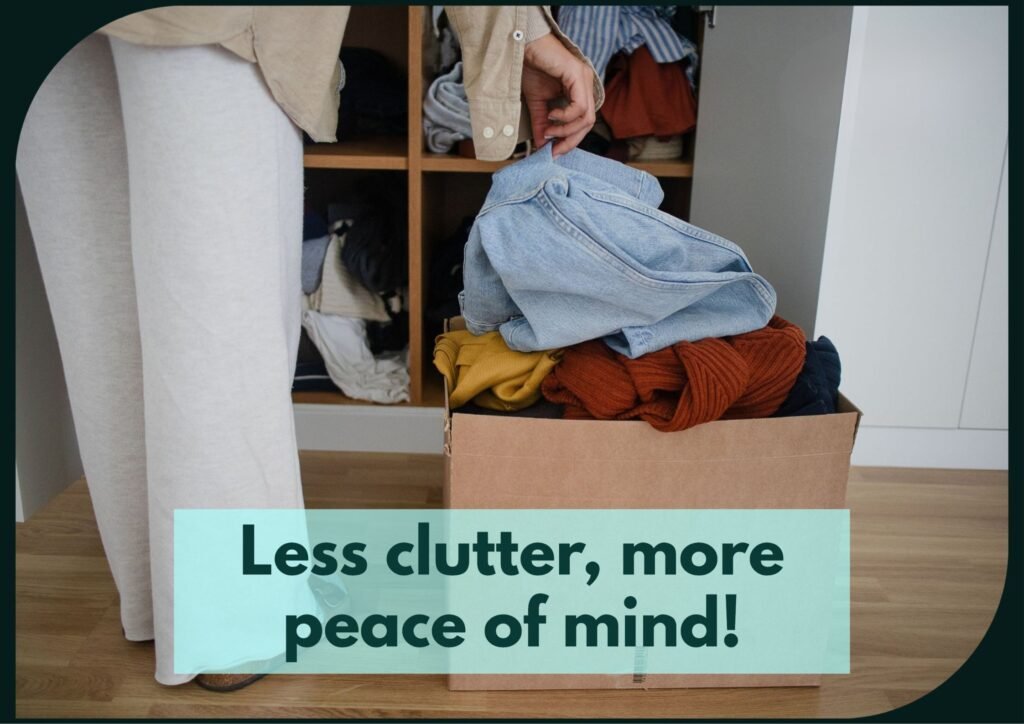Last Updated on June 30, 2025 by Julian Espinosa
Have you ever wondered if the secret to a happier, healthier retirement lies not in accumulating more, but in choosing less? Recent research confirms what many seniors are discovering: minimalism isn’t just a trendy lifestyle choice—it’s a powerful pathway to enhanced wellbeing and vitality in your golden years.
Studies show that minimalist living significantly reduces stress, improves safety, and helps maintain independence while positively impacting both physical and mental health. This isn’t about depriving yourself of life’s pleasures; it’s about intentionally choosing what truly matters and creating space for the experiences and relationships that bring genuine joy.
In this comprehensive guide, you’ll discover how to transform your living space into a sanctuary that supports your health, learn practical strategies for decluttering without overwhelm, and explore how minimalism can actually improve your financial security. We’ll also share the psychological benefits of letting go, from reduced anxiety to increased clarity about your priorities.
Whether you’re looking to downsize, simplify your daily routines, or simply feel more in control of your environment, this approach offers a refreshing perspective on aging with intention and grace. Ready to discover how less really can be more?
Everything You Need to Know About the Art of Living With Less
Research consistently demonstrates the connection between our physical environment and our wellbeing. Disorganized spaces increase the likelihood of falls and accidents, potentially leading to severe injuries and loss of independence. By contrast, organized, simplified spaces support both physical and mental health.
Prefer to listen rather than read?
Understanding How Minimalism Improves Quality of Life
For seniors aiming to streamline their lives and focus on what truly counts, embracing minimalism, also known as the Art of Living with Less, can be incredibly rewarding. Minimalism aids in the promotion of senior health and well-being by decreasing stress and distractions that can cause anxiety and depression.
Seniors are advised to adopt a purposeful way of life, where they’re mindful of their possessions, schedules, and social interactions. By narrowing down their possessions to only the essentials, they can declutter their environment and mind, ultimately leading to a peaceful and contented state.
Embracing minimalism can enhance seniors’ lives and reduce their environmental impact. By promoting reduced consumption and reuse of existing possessions, this lifestyle choice can lead to a simpler and more fulfilling existence in later years. Seniors can start by acknowledging the positive impact minimalism can have on their well-being.
Clearing Clutter to Reduce Stress
Clearing the clutter to reduce stress is an essential element of the art of living with less. As seniors age, the accumulation of possessions can become overwhelming, leading to feelings of stress and anxiety. By decluttering and minimizing possessions, seniors can enjoy a more organized and calming living space.
Clearing clutter can also have many physical benefits, such as reducing dust and allergens that can contribute to respiratory problems. A tidy living space also helps to reduce the risk of falls and improves mobility.
Simplifying possessions can empower seniors to establish a more practical and functional living space, which can pave the way for enhanced health and overall wellness. To initiate your decluttering expedition, follow these tips:
Identify Areas of Clutter
As retirees near the end of their careers, they may be burdened by disorganization in their residences. This messiness can prompt feelings of tension and worry, causing difficulty in unwinding and appreciating their domestic environments.
Decluttering is an excellent way for seniors to reduce stress and improve their health. However, it can be challenging to know where to begin. To initiate a senior’s journey towards a stress-free and well-organized home, it’s crucial to first identify areas that require decluttering. These areas can include physical spaces such as the living room, kitchen, or bedroom.
Seniors can commence by taking a walk around their abodes, making a note of any disorderly or cluttered areas. In addition, they can ask themselves relevant questions, including “Which items do I frequently use, and which ones can I dispose of?” or “Which spaces in my home cause me the most anxiety?”
By recognizing cluttered areas, seniors can create a plan to declutter and reduce stress in their living spaces and appreciate the art of living with less.
Establish a Realistic Timeline for Organizing
One effective strategy for tackling clutter is to establish a realistic timeline for organizing. This can help seniors break down the task into manageable chunks and avoid becoming overwhelmed. It’s important to start with the areas that are causing the most stress or safety concerns.

From there, seniors can gradually work their way through the rest of the home, deciding which items to keep, donate, or discard. By setting achievable goals and celebrating each milestone, seniors can maintain motivation and make steady progress towards a more organized and stress-free living space.
Seek Help From Family and Friends
When seniors embark on the task of minimizing clutter and relieving stress, it’s crucial to enlist the aid of those close to them. Although decluttering can be a calming endeavour, it can prove difficult for older people, taking a toll on them both physically and emotionally. The assistance of loved ones can significantly impact the outcome.
Family and friends can provide practical assistance, such as helping to lift heavy items, sorting through belongings, and making trips to donation centres or recycling facilities. They can also offer emotional support, providing encouragement and motivation, and creating an atmosphere of positivity that can help seniors stay focused on their decluttering goals.
Engaging family and friends in decluttering can build meaningful relationships and memories. Collaborating to create an organized and stress-free living space can strengthen bonds between seniors and their loved ones that endure.
Evaluating Unused Possessions
The Art of Living with Less: How Minimalism Promotes Senior Health and Wellbeing outlines minimalism as a strategy that involves evaluating unused possessions. This method entails examining one’s belongings meticulously, identifying essential items, and discarding unnecessary ones.
Evaluating unused possessions is a crucial step towards embracing minimalism and promoting a fulfilling, healthier life for seniors. You can check out these helpful steps to evaluate unused possessions:
Evaluate the Usefulness of the Items
Seniors may accumulate a significant amount of possessions, many of which they no longer need or use. These items can take up valuable space in their homes, creating clutter and potentially causing safety hazards. One crucial step towards achieving this goal is evaluating unused possessions.
Seniors can evaluate the worth of their belongings by asking relevant questions. Firstly, has the item been used within the last six months or years? If not, it may be unnecessary. Secondly, is the item functional and undamaged? If it is irreparably defective, it’s best to dispose of it.
Finally, seniors should carefully evaluate their possessions to determine which items hold sentimental or practical value. If an item lacks either of these qualities, it may be wise to dispose of it. By doing so, seniors can make informed decisions about what to keep and what to let go of.
Donate Items No Longer Needed
After evaluating unused possessions, it’s important to determine what can be donated or passed on to family and friends. To fully adopt the art of living less, seniors should donate unnecessary possessions like unworn clothes, books, and unused household items.

This declutters homes and reduces time spent on cleaning and organizing. Donating unused objects promotes sustainability by allowing others to benefit from them instead of disposing of them.
Consider Selling Valuable Items
The Art of Living with Less is a philosophy that goes beyond decluttering and reducing possessions. One of the essential components of this mindset is the financial aspect. Aside from donating unwanted items, you may also contemplate selling valuable possessions on virtual marketplaces or via consignment shops.
Seniors can earn additional income and ensure their valuable possessions go to appreciative individuals by taking these steps. This promotes a sustainable and socially responsible lifestyle while creating a more organized and stress-free living environment.
Simplifying Essentials for Everyday Living
The Art of Living with Less is about embracing simplicity and creating a lifestyle that focuses on the things that truly matter. Streamlining necessities is a fundamental tenet of the minimalist way of life.
Simplifying daily living essentials can help seniors focus on what truly matters and eliminate stress and anxiety-inducing distractions. Adopting the art of living with less can also result in reduced household expenses, better sleep, and increased social interactions, ultimately leading to a more fulfilling life. Here are some ways to adopt the art of living with less:
Establish a Minimalist Mindset
Adopting a minimalist approach entails intentionally simplifying one’s life by decluttering belongings, prioritizing necessities, and abstaining from materialistic cravings. To appreciate the art of living less journey, consider implementing the following measures:
Reflect on Your Values and Priorities
It’s crucial to ascertain your principles and preferences to concentrate your time and energy on things that are genuinely significant to you. This can assist you in leading a more purposeful and satisfying life.
Avoid Impulsive Purchases
When making a purchase, it’s vital to consider more than just the pleasure of acquiring something new. Before committing, pause to contemplate whether the product is genuinely necessary and whether it conforms to your principles and objectives.
This approach will help you steer clear of impulsive purchases and guarantee that your acquisitions are thoughtful and purposeful.
Simplify Your Daily Routines
Focus on the essential tasks and eliminate unnecessary ones. Streamline your schedule and avoid multitasking.
Practice Gratitude
Gratitude and contentment are crucial for our overall well-being. Contemporary society continually sends us messages emphasizing the importance of having the latest gadgets, newest clothes, and fanciest cars to achieve happiness.
Despite this, various studies have concluded that material possessions do not necessarily bring greater happiness.
Instead, we should prioritize experiences that include spending time with loved ones, exploring novel destinations, and engaging in hobbies and interests, which can offer more long-lasting joy and fulfilment. Here comes the practice of the art of living with less.
Surround Yourself With Like-Minded People
Connect with others who share your values and support your minimalist ‘the art of living with less’ lifestyle.

Remember that a minimalist mindset is not about deprivation or sacrifice, but rather about choosing what truly matters and letting go of what doesn’t. It can lead to a more fulfilling and intentional life.
Establishing a Regular Decluttering Routine
Encouraging seniors to establish a regular decluttering routine, The Art of Living with Less promotes a minimalist lifestyle. Regular decluttering can enhance senior health and well-being by decreasing stress, promoting a sense of control, and creating a more organized and efficient living space.
To combat overwhelming clutter in your home, it’s important to establish a regular decluttering routine. This involves dedicating scheduled time to sort through your possessions and discard any unnecessary or unused items.
By adhering to a consistent routine, you can avoid clutter accumulation and cultivate a more structured and pristine living environment.
Reducing the Financial Burden of Unnecessary Items
The Art of Living with Less is a lifestyle choice that values simplicity, minimalism, and mindfulness over material possessions. While it may involve decluttering and reducing possessions, it’s not merely a physical process of downsizing.
Reassessing Consumerism Practices
The Art of Living with Less is a philosophy that prompts individuals to reconsider their association with consumerism, consumer culture, and material possessions. This way of life can be particularly significant for elderly citizens whose income is limited, as it can help them sustain a comfortable and hassle-free existence.
Elderly individuals frequently encounter financial difficulties such as constrained income, healthcare expenditures, and lodging costs. Seniors can mitigate these issues by embracing the philosophy of trimming non-essential expenses and prioritizing their needs above their desires.
Financial Stability and Security
Adopting the Art of Living with Less can lead to greater financial stability and security, resulting in improved mental and emotional well-being. This approach encompasses not only cutting costs but also streamlining one’s life and prioritizing what truly matters.
Seniors can derive joy and fulfilment from engaging in low-cost activities, such as spending quality time with cherished ones, engaging in hobbies, or particpating in volunteer work. By giving priority to these pursuits, seniors can lead a more purposeful and meaningful existence.
Practising Self-Care and Focusing on Wellbeing
As part of “The Art of Living with Less: How Minimalism Promotes Senior Health and Wellbeing” philosophy, practising self-care and focusing on wellbeing are crucial components. In minimalism, the emphasis lies on quality rather than quantity, and care for oneself is no different.

Learn How to Say No!
As we grow older, we increasingly appreciate the importance of simplicity and the advantages of the art of living with less. Nevertheless, declining things that no longer benefit us can be arduous. We might feel culpable or compelled to retain possessions that are no longer useful or desirable, resulting in a disordered and stressful living environment.
Learning to say no can be a crucial step in simplifying our lives. It can involve saying no to physical possessions, commitments, or negative thoughts and emotions. By identifying what truly adds value to our lives and prioritizing those things, we can create more space for the things that matter most.
Declining requests can serve as a means to establish personal limits and safeguard one’s resources, resulting in a more gratifying and tranquil existence. Older adults with a desire to streamline their lifestyles should familiarize themselves with the art of refusal. Although it may necessitate diligence and introspection to ascertain what genuinely contributes to our well-being and what we can relinquish, the advantageous outcomes are invaluable.
Self-Care Is the Foundation for a Healthy and Fulfilling Life
The benefits of self-care practices for seniors cannot be overstated. Engaging in activities like yoga, meditation, massage, and exercise can help seniors maintain their physical fitness, flexibility, and mental acuity.
Furthermore, practising the art of living with less can provide seniors with a sense of freedom and clarity. By simplifying their belongings and commitments, seniors can spend more time engaging in their favourite pastimes and activities.
Acknowledge the Inevitability of Death
For seniors who acknowledge the inevitability of death, the art of living with less can be a gratifying lifestyle. With age comes introspection and a realization of the limited time left. This realization motivates seniors to prioritize their lives, emphasizing the things that truly matter.
Minimalism and mortality are intertwined in the sense that our time on this earth is finite. This understanding can prompt individuals to prioritize significant aspects of life, meaningful relationships and experiences, and pursue a purposeful existence.
By adopting the art of living with less, we can develop appreciation and satisfaction for what we possess, rather than ceaselessly pursuing more.
Summary
In conclusion, the art of living with less is a potent means of boosting senior health and wellness. By prioritizing life’s essentials, seniors can alleviate stress, enhance cognitive acuity, and augment efficiency. Moreover, living with less can enhance physical health by decluttering living spaces, creating safer habitats, and fostering daily exercise.
Whether seniors are looking to downsize, simplify their lives, or simply achieve a greater sense of purpose, the art of living with less can be a powerful guide. By embracing these principles, seniors can enjoy greater health, happiness, and fulfilment in their years.
Disclaimer
The content provided on MySeniors.World is for informational purposes only and is not intended as either financial or medical advice. Always consult a qualified professional before making any investment or health-related decisions.
Posts may contain affiliate links, meaning we earn a commission – at no additional cost to you, if you click through and make a purchase. Your support helps us continue providing valuable content.
FAQ: The Art of Living with Less
- I’m worried about regretting getting rid of things.
- Start with a simple test: have you used this item in the past year? If not, it’s likely safe to let go. For sentimental items, keep a small, curated collection of the most meaningful pieces and consider photographing others to preserve memories. Remember, you can always replace functional items if truly needed, but you can’t replace the peace of mind that comes from a simplified space.
- My adult children want me to keep family heirlooms, but I’m ready to let them go. How do I handle this?
- Have honest conversations with your family about your goals and their attachment to these items. Offer to give heirlooms directly to family members who want them. If they’re not ready to take them now, set a timeline for decision-making. Remember, you’re not obligated to be the permanent storage facility for family memories.
- I live in a small space already. Can minimalism still benefit me?
- Absolutely! Minimalism isn’t about the size of your space—it’s about how intentionally you use it. Even in small spaces, reducing clutter can improve safety, make cleaning easier, and create a sense of calm. Focus on keeping only items that serve a clear purpose or bring you genuine joy.
- I’m on a fixed income. Won’t I save money by keeping things “just in case”?
- While this concern is understandable, consider the true cost of keeping everything. Storage, organization, and maintenance of unused items can be expensive. Most “just in case” items are never actually needed. Minimalism often leads to better financial health by reducing impulse purchases and helping you focus spending on what truly matters.
- How do I maintain a minimalist lifestyle when family members keep giving me gifts?
- Communicate your new lifestyle goals with family members and suggest alternatives like experiences, consumables, or charitable donations in your name. When you do receive physical gifts, apply the same evaluation criteria—keep what serves you and donate the rest. Remember, you can appreciate the thought behind a gift without keeping the item forever.
- I feel guilty about getting rid of things that were expensive or still have value. What should I do?
- The money was spent when you purchased the item—keeping it doesn’t recoup that cost. Consider selling valuable items you no longer need, which can provide some financial return while helping the items find new purpose. For less valuable items, remember that their highest value now might be in freeing up your space and mental energy.
- My spouse isn’t interested in minimalism. How can I pursue this lifestyle without causing conflict?
- Start with your own belongings and spaces, demonstrating the benefits through your example. Focus on shared benefits like easier cleaning, better home safety, and more space for activities you both enjoy. Respect their timeline and don’t pressure them to participate. Often, seeing the positive effects will naturally encourage their interest.
REFERENCES
- Blackburn, S., et al. (2024). Could a minimalist lifestyle reduce carbon emissions and improve wellbeing? A review of minimalism and other low consumption lifestyles. WIREs Climate Change. Retrieved from https://wires.onlinelibrary.wiley.com/doi/10.1002/wcc.865
- TerraBella Senior Living. (2024, July 4). Minimalist Living: A Path To Healthier Aging. Retrieved from https://www.terrabellaseniorliving.com/senior-living-blog/minimalist-living-a-path-to-healthier-aging/
- Unlimited Care Cottages. (2024, August 7). The Many Benefits of Minimalism for Seniors. Retrieved from https://unlimitedcarecottages.com/blog/senior-living/the-many-benefits-of-minimalism-for-seniors/
- Organize by Flo. (2024, July 22). Creating Safe and Organized Environments for Seniors with Mobility Issues. Retrieved from https://www.organizebyflo.com/post/creating-safe-and-organized-environments-for-seniors-with-mobility-issues
- Care a Parent. (2023, December 8). Effective Home Organization and Decluttering Tips for Seniors. Retrieved from https://careaparent.com/effective-home-organization-and-decluttering-tips-for-seniors/
- BSW Health. (2024). Letting go for a happier, healthier you: 5 health benefits of minimalism. Retrieved from https://www.bswhealth.com/blog/health-benefits-of-minimalism
- RCP Management Company. (2023, December 12). Benefits of a Minimalist Lifestyle for Seniors. Retrieved from https://www.rcpmco.com/benefits-of-a-minimalist-lifestyle-for-seniors


